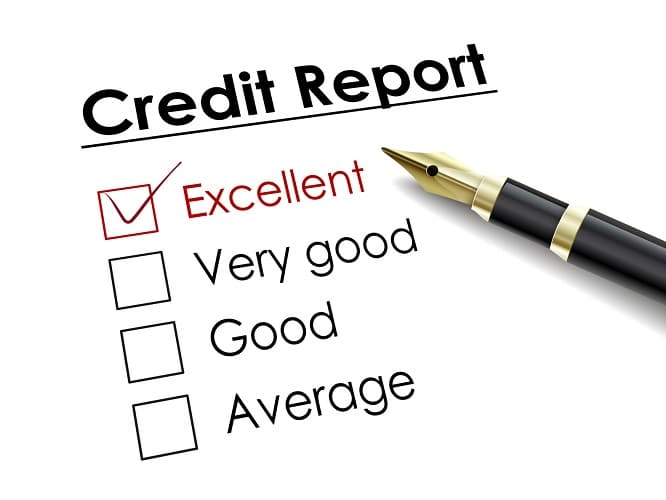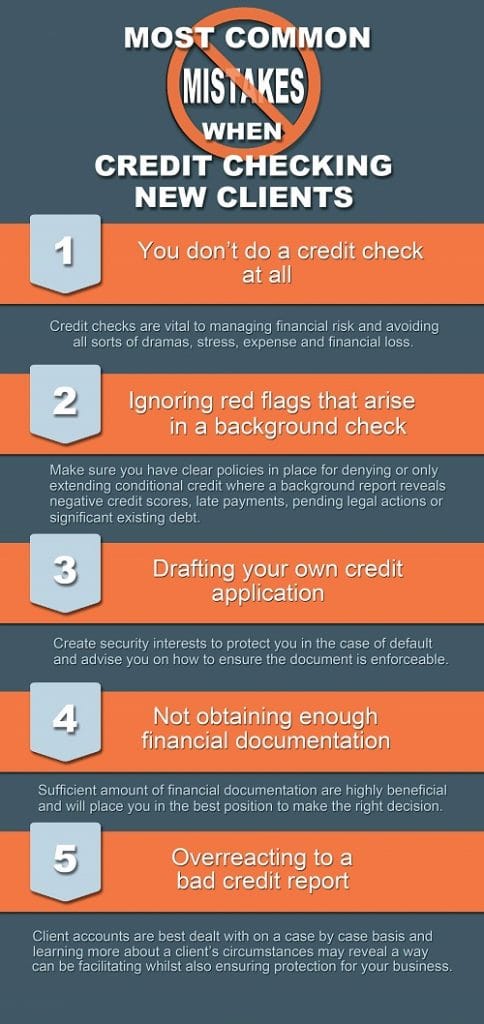
Quite often, the key focus of business owners is sales, sales, sales. Their front-end is geared to consume a disproportionate amount of resources directed at bringing clients in, with little to no regard for whether those clients will yield profits. In many cases, this leads to aged debt, strained client relationships and a significant decrease in realisation, profits and efficiency.
While it is vital to keep clients coming in the doors, it must not be pursued at the cost of good business practices. Profits come from paid invoices – not sales. So businesses must take great care when dealing with new clients. Time and resources must be set aside to get to know and understand the companies or individuals you are dealing with and whom you are counting on to repay extended credit.
Want to kick your business up a gear in 2017? Avoid these common mistakes made by businesses when it comes to background checking new clients.

You don’t do a credit check at all
Alarm bells! It really can’t be stressed enough – credit checks are vital to managing financial risk and avoiding all sorts of dramas, stress, expense and financial loss. If you haven’t got systems in place to screen clients to whom you offer goods or services on credit, you really need to make this a priority.
Ignoring red flags that arise in a background check
Emotional investment causes many business owners to ignore or minimise the significance of red flags that arise in a client’s credit check for fear of losing “the sale”. Failing to act on a credit check can be as detrimental as not doing one, (but probably more stressful). Make sure you have clear policies in place for denying or only extending conditional credit where a background report reveals negative credit scores, late payments, pending legal actions or significant existing debt.
Read Also: The Serious Task of Debt Collection
Drafting your own credit application
Your credit application should be capable of collecting all the key information required to assess an applicant’s financial position. A business lawyer is in the best position to draft such a document as they can ensure appropriate questions are asked of applicants. They can also draft your terms and conditions of credit, create security interests to protect you in the case of default and advise you on how to ensure the document is enforceable.
Not obtaining enough financial documentation
The twofold purpose of a background check is to assess: (1) a client’s ability to pay (2) its willingness to pay. A sufficient amount of both financial documentation together with historical and anecdotal evidence of the character of the individuals behind the business are therefore highly beneficial and will place you in the best position to make the right decision.
Commercial credit reports are a great start as they can show historical payments, bankruptcy records, lawsuits, liens, court judgements and a credit rating. Examining a client’s profit and loss sheets and bank statements can also give an indication of the cash flow they are managing to generate.
To determine a client’s likelihood of paying in a timely manner, seek out personal credit histories of the owner or CEO, looking out for defaults and court judgements. General information on past business failures, attitudes toward ethical standards, and reputation with other suppliers may also yield valuable insights.
It may seem excessive or paranoid to be snooping around behind your client’s back for such information, but its what all prudent businesses do and it could ultimately save you from the one bad client that will plunge you into financial ruin.
Overreacting to a bad credit report
It is wise to exercise caution with new clients, however you may also be disadvantaged by being overly so. Some overzealous risk managers make the mistake of instituting a blanket policy of refusing to trade at all with clients who come back with a poor credit score. However this may not always be necessary to protect your business.
While stringent credit policies are important, client accounts are best dealt with on a case by case basis and learning more about a client’s circumstances may reveal a way that trade can be facilitating whilst also ensuring protection for your business. It may be that a client experiences predictable fluctuations in trade conditions throughout the year rendering them more vulnerable to cashflow issues at certain times or has incurred a bad credit rating as a result of an isolated dispute with another supplier. In some cases, such clients can be accommodated with adjusted credit terms or some sort of additional security such as a guarantee, bond or letter of credit.
Deciding whether to extend substantial credit to a new client can be stressful. If you are in doubt about how to properly screen clients and identify red flags, get help from a professional. It’s important to be confident and decisive when it comes to credit so that you don’t relinquish sales or get pushed around by clients.
If 2017 is the year to get your business on track, give your credit check processes an overhaul. Your accounts receivables team with thank you.





